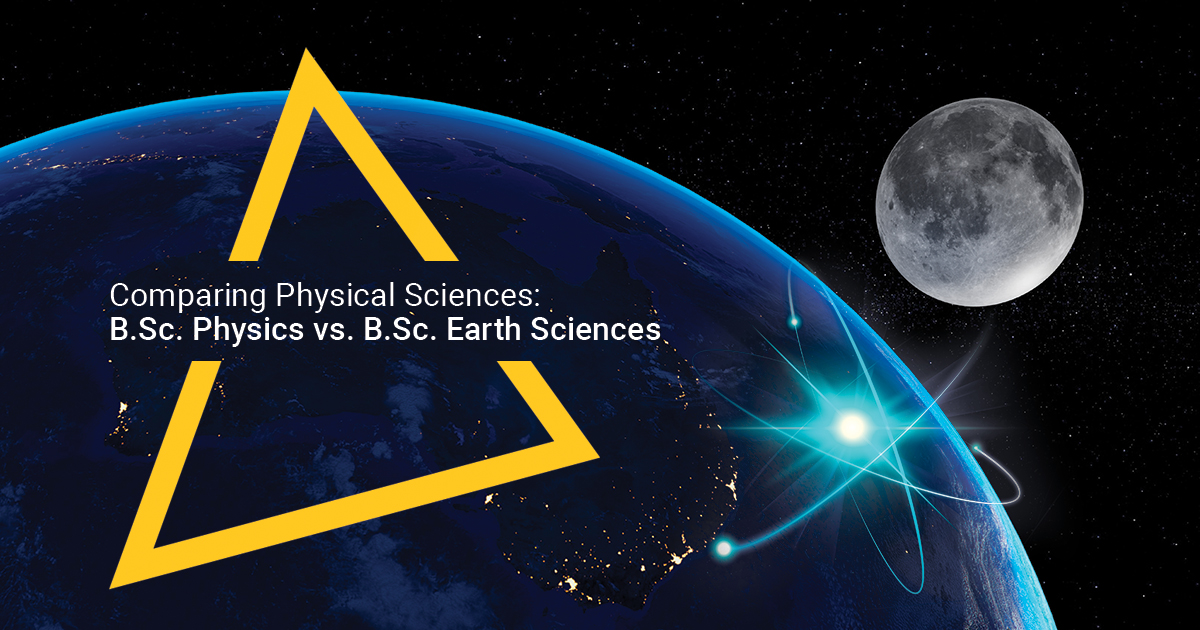Blog Detail


Comparing Physical Sciences: B.Sc. Physics vs. B.Sc. Earth Sciences
27-11-2024

In physical sciences, we study the inorganic world. The four main branches in this stream are Physics, Chemistry, Earth science and Astronomy. In these four fields, there are many subfields that you can choose from. At the undergraduate level, you can pursue a B.Sc. in any of these four branches. The syllabus covered the theoretical and practical aspects of the Physical Sciences. To qualify for the programme, you must do the 12th grade in the Science stream with Physics, Chemistry, Maths, and Biology as core subjects. The B.Sc. programme lays the foundation for a career in these streams and promotes a person's problem-solving skills.
Overview of B. Sc. Physics
The B.Sc Physics course is a 3-year programme. Some institutes also offer a 4-year long programme with some advanced Physics subjects.
The core subjects that students learn in this course are –
● Mechanics
● Electricity, Magnetism, and EMT
● Thermal Physics and statistical mechanics
● Waves and optics
● English communication
The elective subjects that students can choose include –
● Digital, Analog and Instrumentation
● Elements of Modern Physics
● Mathematical Physics
● Solid State Physics
● Quantum Mechanics
● Embedded System: Introduction to microcontroller
● Nuclear and Particle Physics
● Medical Physics
Students are also offered some skilled enhancement courses such as –
● Physics Workshop Skills
● Computational Physics Skills
● Electrical circuit network Skills
● Basic Instrumentation Skills
● Renewable Energy and Energy harvesting
● Mechanical Drawing
● Radiology and Safety
● Applied Optics
● Weather Forecasting
All colleges will not offer all the elective courses or skill enhancement courses. So, when you select a programme, you have to see if they are offering the elective course that you want. Students have to appear for written exams, laboratory work, and dissertations throughout the course.
Overview of B.Sc. Earth Science
The B.Sc. Earth Science discipline focuses on topics such as geography, seismology, geology, palaeontology, and similar subjects. It focuses on Earth and the surrounding cosmos to study its effects on the planet and environment. Students will touch upon subjects such as chemistry and environmental science. Earth Science graduates will be able to explain the causes of global warming, seismic disturbance, floods, and pollution, suggest preventive measures and predict their occurrence. The syllabus for the course is –
● Geology
● Marine Geology
● Hydrogeology
● Geochemistry
● Ore Geology
● Drilling Engineering
● Geomorphology
● Geo-Mechanics
● Sedimentology
● Palaeontology
● Seismology
● Environmental Studies
● Statistical Methods of Geosciences
The best universities in India that offer the B.Sc. Earth Science courses accept 12th marks from any board and entrance exams such as JEE, GATE, MET, BAT, and so on.
Prospects after course completion
With a B.Sc. degree in hand, a graduate can expect entry-level roles.
After B. Sc. in Physics, you can work as –
● Research Associate
● Geophysicist
● Acoustic Consultant
● Nanotechnologist
● Radiation Protection Practitioner
● Technician
● Physicist
● Teacher
● Lab Supervisor
You will work with electronic product manufacturing companies, colleges, coaching institutes, government agencies, schools, research centres, or hospitals.
With a B.Sc. Earth Science, the career alternatives are –
● Geologist
● Mineralogist
● Marine geologist
● Seismologist
● Oceanographer
● Environmentalist
● Palaeontologist
You can also work with NGOs, government agencies, mining companies, meteorological departments, oil and natural gas companies, and other private companies.
With pure science subjects such as Physics or Earth Science, you have to pursue Masters and Doctoral studies for specialisation. The B.Sc. programme provides a wide overview of the subject, but to specialise in any single area, one has to do their post graduation. Often students choose to do a management programme or pursue some interdisciplinary programmes to supplement their learning and expand their skill sets. You can also appear for various entrance exams for government jobs and in various departmental roles. Also, many roles with larger responsibilities require a postgraduate certificate too. In the three years of graduation, you will be exposed to many opportunities that will enable you to decide what course to pursue in the future.